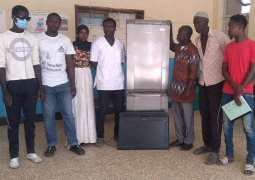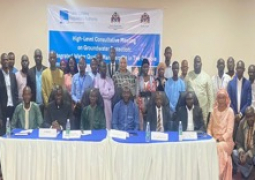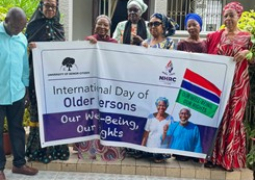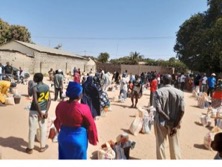
Muhammed Nyan made this disclosure at a recent food distribution to the community of Sukuta courtesy of WHIPSO held in Sukuta. The items donated include 200 food packages and 20kg of rice, 5kg of sugar, 3.6kg of onion, tomato paste, soap, spaghetti, bucket, cup, choco power, 10 sachets of milk and jumbo.
On the same day, the organisation also distributed 1,000 iftar food packs to five mosques.
Muhammed Nyan the CEO of WHIPSO said that his organisation was able to distribute food items to at least 700 needy families.
“Helping people with food is very crucial because it has to do with our daily plans. With food, one can work with a very comfortable mind.”
WHIPSO, he added, is a charity that started last year in The Gambia and that plans are underway to establish a company in the country.
“The distribution of food packs to needy families started during this year’s Ramadan and we have been to Gunjur, Faraba, Nuimi, Basse and Sukuta”.
In Sukutu, he said, they initially gave out 100 food packs, followed by another 200 packs.
He revealed that they have other projects in the pipeline such as boreholes, sponsorship for Madrassas and construction of 20 classrooms at Pan Africa.
He spoke of plans to support the Sukuta Horticultural Women’s Garden, saying they had earlier assisted them with 36 solar panels and a pump worth over D300, 000.
He explained that the move came after the organisation realised that the women use the garden money to buy cash power for electricity which cost them about D15,000 per month.
“We want to take youths from the street and create job opportunities because the government cannot do everything. We have a social corporate responsibility and need to contribute our quota. Therefore, we do organise a borehole drilling apprenticeship for a minimum of six months. At the end of the program, we will incorporate them into our team and drill boreholes for ourselves.”
Omar Bojang, also expressed similar sentiments, further explaining that supporting the people is a big pleasure to them. “We’ve started very young as an organization.”
Bojang observed that the country is losing a generation as a lot of young people are now on the streets. “We cannot depend on government entirely to provide everything, instead we should contribute something as they did.”
Read Other Articles In National News
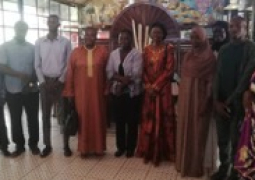
NAATIP trains labour inspectors on tips, recruitment indicators
Aug 16, 2023, 11:33 AM
